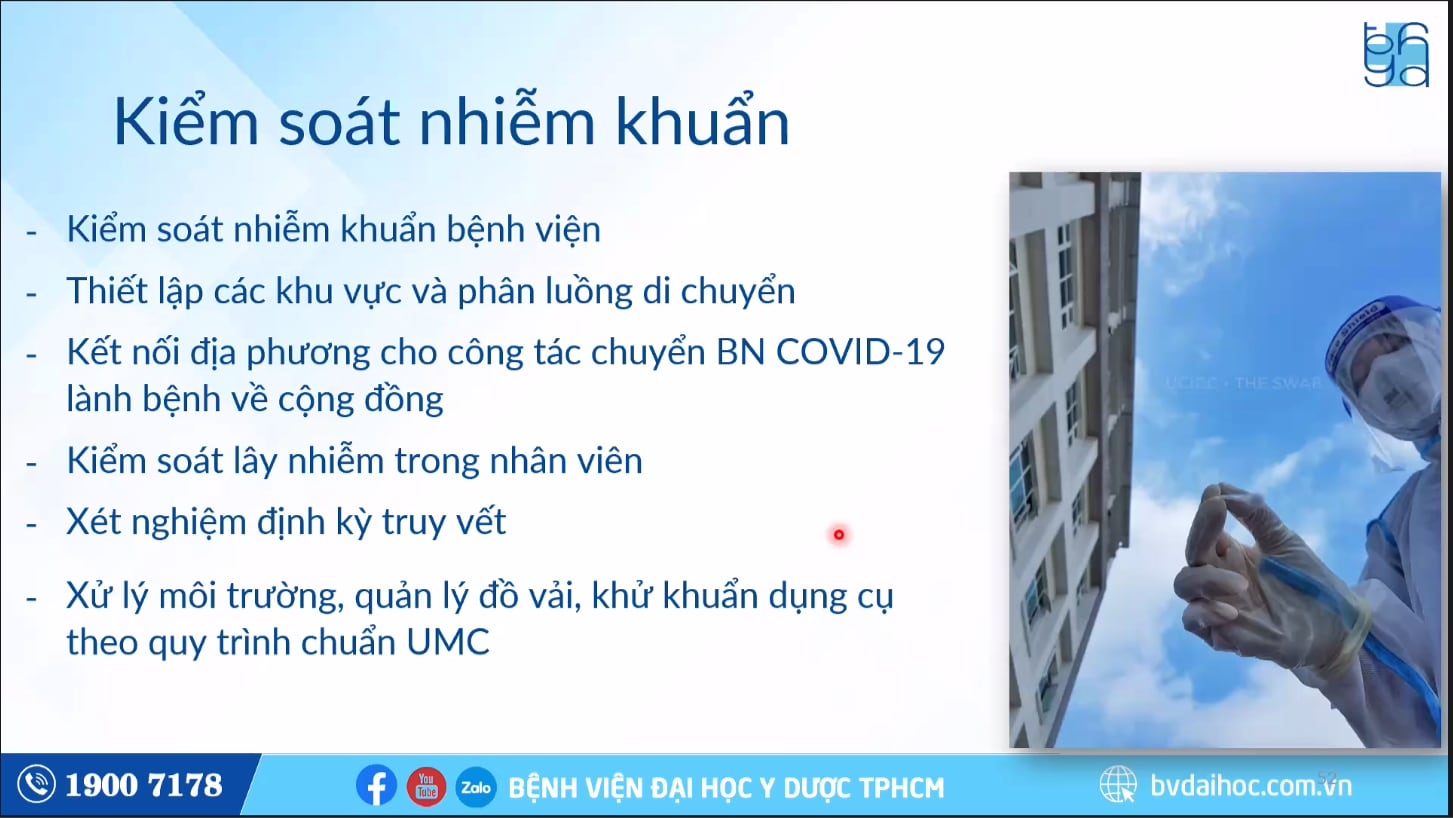At a glance
- In 2021, Vietnam's successful COVID-19 containment was disrupted by the Delta variant surge.
- CDC swiftly established virtual training for infection control, lab quality, and epidemiology, facilitated real-time PCR testing training, and developed a data analysis curriculum to help health officials effectively monitor outbreaks.
- These CDC-led efforts effectively strengthened Vietnam's public health system, even amidst the pandemic.
Supporting Vietnam's Fight Against COVID-19 During the Delta Variant Surge

Vietnam's early and sustained success in limiting the spread of COVID-19 was challenged by the highly infectious Delta variant that caused a rapid surge in cases. By spring 2021, Vietnam's "zero COVID" containment strategy was derailed by skyrocketing hospital admissions and an increasing need for government and public health officials to act.
With nearly 25 years of trusted partnership and cooperation advancing Vietnam's health systems, U.S. Centers for Disease Control and Prevention (CDC) recognized an opportunity to support Vietnam through this challenging situation.
While lockdowns and travel restrictions limited in-person access to much needed assistance and training, CDC Vietnam worked quickly to establish innovative means of providing virtual training and technical support to the organizations and people leading Vietnam's COVID-19 response. By organizing virtual trainings that focused on three critical areas of infectious disease control: infection prevention and control (IPC), laboratory quality control, and epidemiologic analysis, CDC Vietnam was able to rapidly adapt to support Vietnam's COVID-19 response. In addition, CDC Vietnam's assistance will have long-term value for the country by benefiting its people and strengthening its lab and workforce systems toward sustainable health security.
Promoting Infection Prevention and Control Among Healthcare Responders
From the onset of the pandemic, CDC Vietnam supported The Ho Chi Minh City Infection Control Society (HICS) by developing virtual training on IPC for healthcare workers responding to COVID-19, including extensive training on proper usage of personal protective equipment (PPE).
When cases began to rise in the summer of 2021, HICS came back to CDC Vietnam requesting new and refresher training opportunities focused on real-life experiences of healthcare staff. Once again, CDC Vietnam specialists rapidly responded.
From August to September 2021, the training series reached over 3,200 people, including 1,309 medical doctors, 1,268 nurses, 37 public health staff, 63 laboratory technicians, and nearly 600 others, including medical students. More than 60 percent of participants were from the southern region of Vietnam—where the COVID-19 case load was most concentrated.
CDC Vietnam experts Thuy Do and Bui clocked in more than 30 extra hours in five weeks to support trainings, primarily in the evenings. Pre- and post-test knowledge checks showed average participant scores improved by 20 percentage points throughout the course of the training, and 98 percent of participants expressed satisfaction with the series showing the effect and value of the training on improving outbreak response effectiveness.

Impressed by the positive reception, the Vietnam Chief Nurse Club within the Ministry of Internal Affairs requested similar training, specifically for head nurses. In this series, COVID-19 IPC information was supplemented by advice related to expectations for deployed nurses and medical students, as well as risk assessment and management techniques in a COVID-19 context. Another 4,295 workers participated in this training series from July through September 2021.
By being responsive to training requests, providing timely information, and demonstrating dedication to improving health outcomes, CDC Vietnam experts reaffirmed their role as valuable sources of knowledge and partners in the Vietnamese healthcare network.
Improving Quality Control for SARS-CoV-2 Testing
The work to support the COVID-19 response didn't stop there. Taking a cue from the topics of greatest interest during the IPC virtual trainings, CDC Vietnam worked with the Quality Control Center (QCC) for Medical Laboratory, University of Medicine and Pharmacy at Ho Chi Minh City to develop four additional virtual trainings on topics related to real-time PCR testing, biosafety, collection and storage of samples, and quality assurance.
CDC Vietnam had identified something the laboratories were interested in as the number of participants in these trainings exceeded the 1,000 participants maximum allowed by Zoom. To accommodate the high demand for training, registered participants were invited to view a private stream on YouTube.
Total attendance and views (including live and post-recordings) exceeded 27,000 across all four sessions. Participants included COVID-19 test administrators, lab managers, and healthcare workers.
Seeing the value in these virtual sessions, partners from the QCC used training materials to organize an additional five sessions, reaching another 585 participants and providing credit towards continuing medical education (CME) in their organization. The extensive reach of the training helped expand Vietnam's capacity to ensure that IPC standards, including proper use of disinfectant sprays to eliminate SARS-CoV-2 from surfaces and gowns to protect healthcare workers, were enforced, thereby reducing overall risk for potential infection.
Field Epidemiology Training Program (FETP) Trains Individuals to Map Outbreaks
In response to the unexpected surge in COVID-19 cases, Pasteur Institute of Ho Chi Minh City (PIHCMC) invited CDC Vietnam to build provincial capacity to automate data analysis to provide real-time updates as case reports were entered.
As the requests for training on this technology continued to climb, CDC Vietnam engaged national-level FETP coordinators to quickly develop a curriculum to virtually teach more health officials how to build, operate, and optimize COVID-19 dashboards to interpret province-specific data.
Did you know?
A call for applications to fill 30 spots in the training through the Vietnam FETP network garnered more than 110 applications from 48 health agencies and 20 provinces. Eighteen 2-hour evening training sessions were conducted over the course of six weeks with a 92 percent attendance rate.
CDC Vietnam's Bach Dao, lead trainer, was surprised by the dedication of the participants Despite the fact that all the participants held full-time jobs as public health officials leading the COVID-19 response, they attended training sessions in the evenings and completed additional exercises.
"The training ended at 9 p.m. so I expected them to sign off, but they didn't. They followed me from breakout room to breakout room so they could learn more," said Dao.
With their new knowledge, trainees developed a set of visualizations to quickly show COVID-19 gaps and highlight priorities, allowing them to effectively monitor the situation in their provinces and provide specific recommendations. Flexible COVID-19 risk maps were adapted to reflect changing guidelines in the country.
Provincial-level officials concurred that the training was successful. "This course was organized at the right moment when we were dealing with massive data collection requirements. It helped us to rapidly transform raw data into insightful information for action. I hope CDC Vietnam FETP will have more courses like this in the future," shared a Vietnamese health official from An Giang province.
Overall, the response of Vietnam's FETP to COVID-19 demonstrated its value in responding to a public health crisis.
Building Partner Trust Creates New Opportunities
Overall, thousands of public health workers benefitted from CDC Vietnam's online trainings. Online training platforms increased reach, improved public health expertise, and enabled public health partners across Vietnam to access critical information in real time to improve the COVID-19 response in Vietnam. By providing this level of effective rapid response to support the health systems of Vietnam, CDC Vietnam further strengthened its relationships and expanded trust with public health partners. Additionally, Ministry of Health demand for CDC Vietnam's technical support increased compared to pre-pandemic. Grounded in nearly 25 years of cooperation and made stronger by the collaboration required during a global pandemic, CDC Vietnam truly stands as a strong partner for Vietnam's Ministry of Health in building a high-quality public health system and workforce.
